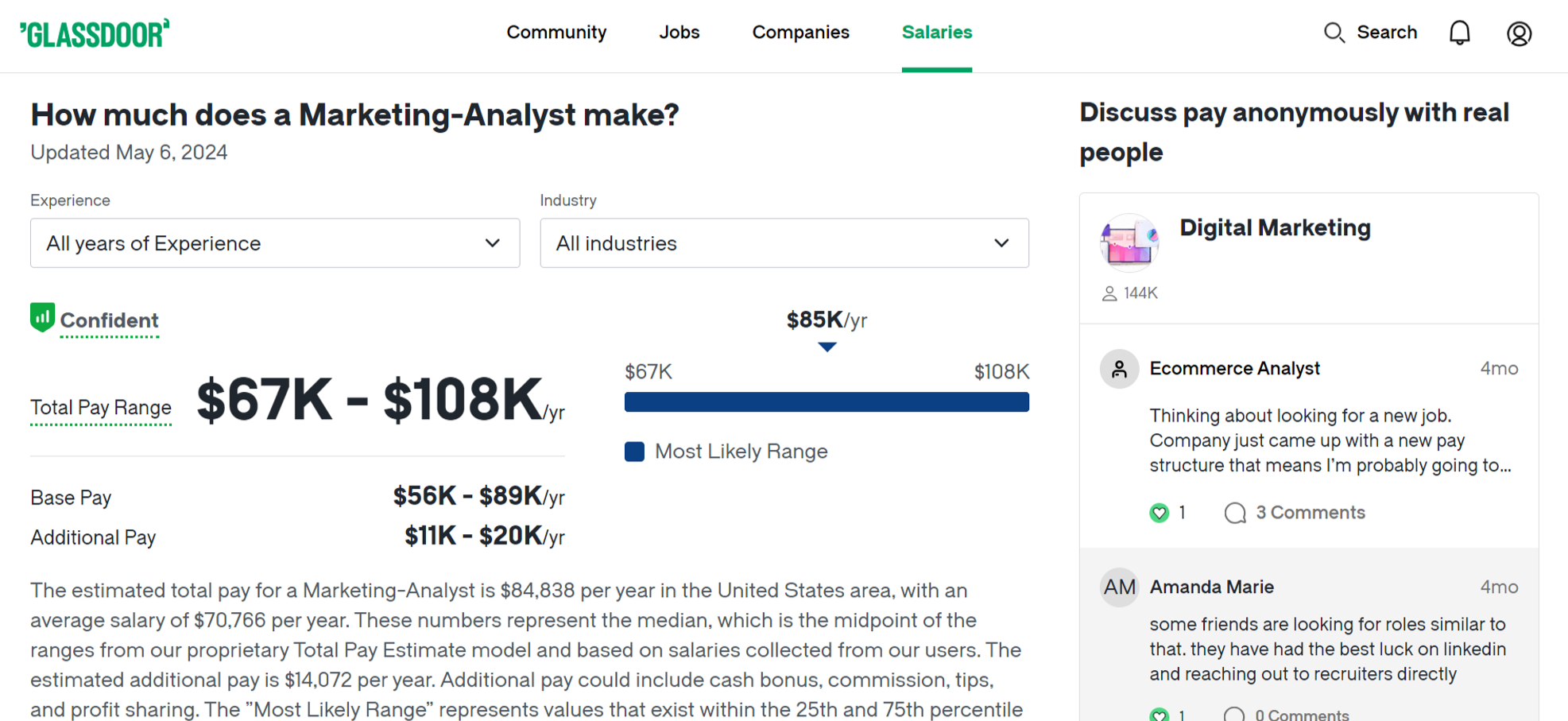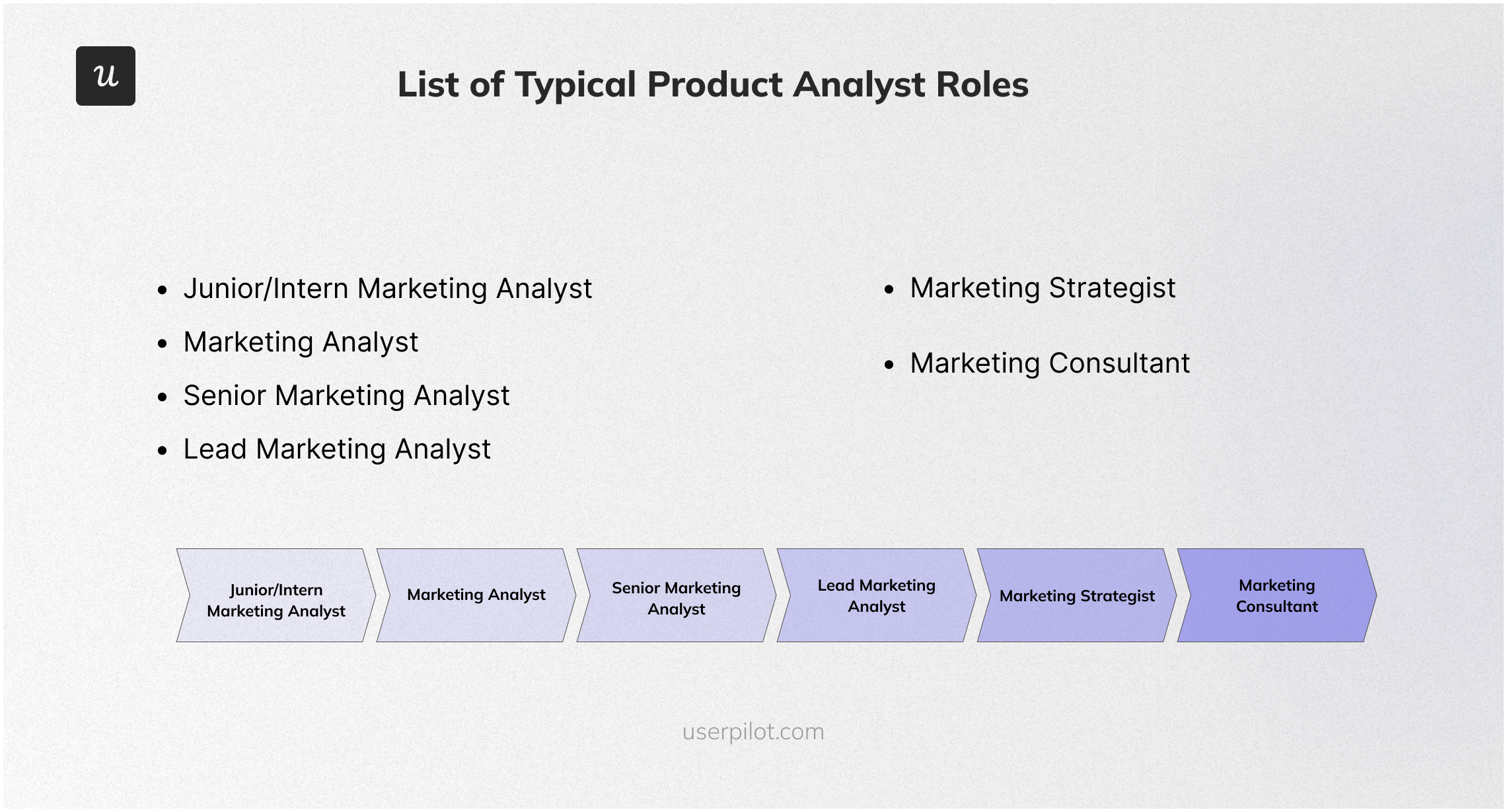
Try Userpilot Now
See Why 1,000+ Teams Choose Userpilot

What is a marketing analyst?
A marketing analyst is a professional who carries out market research for a product, tracks trends, and identifies growth opportunities for the company.
A marketing analyst helps you discover how best to position your SaaS product in the market to attract the right growth opportunities. After making these findings, the marketing analyst reports them to stakeholders and other members of the marketing team to guide decision-making.
What does a marketing analyst do?
A marketing analyst carries out market research to spot trends, monitor performance, and pinpoint opportunities for the company to grow.
In carrying out this market research, the marketing analyst interviews product users and collects data using surveys, opinion polls, and user research tools like Userpilot to enable SaaS companies to make data-driven decisions.
Marketing analyst’s main responsibilities
A marketing analyst is an important individual in the company who provides insights into market conditions for the stakeholders to enable them to make the right decisions.
Here are some of the main responsibilities and duties of a marketing analyst in a SaaS company:
- Research: Market research is one of the core duties of a marketing analyst. A market analyst researches the market to identify trends and performances the company can take advantage of in its marketing strategy. A marketing analyst carries out user behavior research by identifying user needs and getting feedback from them directly. A marketing analyst also performs research on competitors by analyzing their strategy and gaps to explore.
- Data analysis and interpretation: After gathering different data from data sources, the marketing analyst analyses and visualizes the data. Data analysis and interpretation is one of the crucial responsibilities of a marketing analyst, there is, therefore, the need for proficiency in tools like Tableau, SQL, R, Google Charts, and Excel.
- Data Reporting: When a marketing analyst analyses and interprets the data obtained, they visualize it by transforming it into graphs, charts, and PowerPoint presentations and report these findings to stakeholders.
- Collaboration with other teams: The marketing analyst collaborates with other members of the team, such as the marketing manager, to develop and optimize marketing campaigns for more conversions.
- Reporting on marketing campaigns: A marketing analyst also measures the impact of marketing campaigns and reports. This includes conversion rate, lead generation, website traffic, social media engagement and shares, customer acquisition cost, click-through rates, and ROI on the marketing campaigns. They monitor the company’s marketing channels and campaigns and report on them.
- Identification of growth opportunities: Using the data obtained from the research, the marketing analyst finds growth opportunities and presents them to stakeholders.
- Tools Research: A marketing analyst researches tools that will benefit the marketing processes of the company. This ranges from tools for better attribution to social media marketing tools and product research tools.
- Trends Monitoring and Forecasting: A marketing analyst also stays on top of the different trends in the market, identifies opportunity gaps early, and helps the company maximize them.
Marketing analyst salary
According to Glassdoor, the median estimated total pay of a marketing analyst in the United States is $84,838 per year, with an estimated salary of $70,766.
However, the salary of a marketing analyst varies due to some factors such as years of experience, the sector you work in, and where you live. In this section is a detailed breakdown of the salary of a marketing analyst, starting with the level of experience:
Junior Marketing Analyst (1-3 years): $64K – $95K/year
Senior Marketing Analyst (4-6 years): $67K – $104K/year
Lead/Principal Marketing Analyst: (7+ years): $71K/year and above
Secondly, your industry of work affects your salary. For instance, if you work in the healthcare sector, your salary may differ from that of someone working in the Information and Technology sector.
According to Glassdoor, here are the top 3 sectors where the marketing analyst earns the most total pay:
- Information Technology: $109,919/year
- Energy, Mining, and Utility: $94,835/year
- Pharmaceutical and Biotechnology: $92,329/year
Your location also affects your salary, especially with remote working where company employees may live in different countries around the world, and with different standards of living. Here are the midpoint salaries for some of the biggest cities in the United States.
- San Francisco: $91,662/year
- New York: $104,135/year
- Boston: $73,398/year
- Washington DC: $77,160/year
- Chicago: $83,533/year
Marketing analyst career path
The marketing analyst career allows for room for growth as your skillset and years of experience increase. Here is a typical career path for a marketing analyst:
- Junior/Intern Marketing Analyst: This is a junior role where you get to learn how to use market research and data analysis tools. You also learn to learn more about marketing channels and how to monitor performance and gather marketing data.
- Marketing Analyst: The marketing analyst is a more senior position where you take on more responsibilities, such as marketing data analysis, visualization, and reporting. In this role, you report to the senior/lead marketing analyst.
- Senior/Lead Marketing Analyst: The Senior/Lead marketing analyst oversees all activities related to marketing analysis for the company.
- Marketing Strategist: From the data obtained from marketing analysis, the marketing strategist develops growth strategies to guide and improve the company’s marketing. Using their expertise, they also forecast future market trends.
- Marketing Consultant: The marketing consultant role is one of the highest roles in marketing analysis, where you are consulted for marketing strategies due to your expertise. You vet marketing data and strategies to identify growth opportunities.
How to become a marketing analyst
Becoming a marketing analyst requires you to have an undergraduate degree in marketing, business administration, statistics, or computer science. Once you have any of these degrees, you can apply to entry-level roles in your desired industry sector. When you land an entry-level role, do your best to acquire proficiency in technical skills such as data analysis and other skills.
Additionally, you can take extensive courses on marketing analysis on online platforms like Coursera and Udemy and get globally recognized certificates to accelerate your learning speed.
Best resources for marketing analysts
Marketing is constantly evolving. To stay on top of your game as a marketing analyst, you need to access resources regularly. This ranges from blogs to webinars to podcasts and books. We’ve curated the best resources for a marketing analyst:
Best books for marketing analysts
- Digital Marketing Analytics: Making Sense of Consumer Data in a Digital World By Chuck Heeman and Ken Burbarry: The book explains how to get maximum insights from marketing data and translate them into actionable information that can influence and change your marketing game
- Successful Analytics: Gain Business Insights by Managing Google Analytics by Brian Clifton: One peculiar fact about this book is that it is tool-specific. It focuses on how you can get marketing data from Google Analytics, a tool every marketing analyst should learn how to use.
- Marketing Analytics: Essential Tools for Data-Driven Decisions by Rajkumar Venkatesan, Paul W. Farris, and Ronald T. Wilcox: With practical examples, the book teaches how to identify the data that matters and use it to drive actionable insights.
Best webinars for marketing analysts
Marketing analysts play a critical role in measuring and optimizing marketing campaigns. So here’s a list of helpful resources for you to grow your analysis skills:
- Userpilot Events focuses on product growth and user onboarding, which are crucial aspects for understanding user behavior and optimizing marketing campaigns. Their webinars delve into user journey optimization, feature adoption analytics, and user engagement strategies – all feeding directly into your marketing analytics efforts.
- Tableau frequently hosts webinars on data visualization using their popular software. You can also find webinars on broader marketing analytics topics like campaign attribution and marketing ROI measurement.
- eMarketer (Consider a free trial or membership for full access) offers webinars and research reports on various marketing topics. Gain insights into industry trends and consumer behavior to inform your marketing analytics strategies.
- Singular specializes in marketing attribution solutions and offers webinars on building effective attribution models and optimizing marketing campaigns based on data insights.
Best blogs for marketing analysts
- Userpilot Blog: The userpilot blog is a comprehensive blog with valuable resources that provide insights into market and user research.
- Adverity Blog: The adverity blog focuses on how to make sense of marketing data to drive company growth.
- Decision Analyst Blog: The blog focuses on how to conduct market research and analyze consumers.
Best podcasts for marketing analysts
- Marketing and Analytics by Alexander Sofranas: This is a podcast by Alexander Sofranas that combines marketing and analytics and is one of the best podcasts for a marketing analyst who wants to learn and stay ahead of trends.
- The Marketing Intelligence Show by Supermetrics: The podcast is like an interview with different marketing analysts and seeks to find out how they use data to make informed company decisions and drive growth.
- AnalyticsToday Podcast by Jeremy Roberts and Sameer Khan: In the podcast, Jeremy interviews some core data leaders in the world and interviews them on data-related topics.
Best tools for marketing analysts
Tools are a critical part of a marketing analyst’s work and determine how efficient you are. Here are the best tools for marketing analysts:
- Best Tool for Product and User Research (Userpilot): Userpilot gives you adequate insights into your product and your users.
- Best Tool for Business Intelligence (Tableau): Tableau is a business intelligence tool that helps you present your market research findings to people with ease.
- Bes Tool for Data Analysis and Reporting (Power BI): Power BI is one every marketing analyst should learn for data analysis and visualization for easy reporting.
- Best Tool for Visualization (Google Charts): Google Charts is one of the best tools for data visualization as it helps you present your data in charts and graphs.
- Best Tool for Project Management (Notion): A marketing analyst must be able to stay organized and manage their products effectively and Notion is an excellent project management tool.
Conclusion
We hope our article has given you a good overview of the career path for marketing analyst. Whether you’re just starting out or looking to advance, the key is to stay curious, keep learning, and remain open to new opportunities along the way.
Looking into tools for marketing analysts? Userpilot is an all-in-one product platform with engagement features and powerful analytics capabilities. Book a demo to see it in action!









